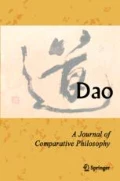Abstract
Yi Hwang 李滉 (1501–1570), also known as Yi T’oegye 李退溪, was a prominent Korean scholar of Confucian philosophy during the Chosŏn 朝鮮 dynasty. He reinterpreted the Zhu Xi 朱熹 (1130–1200) school of neo-Confucianism, taking reverent seriousness (kyŏng 敬) as the core principle of his philosophy. He studied various symptoms observed in the human mind and suggested the notion of reverent seriousness as a primary therapeutic method. His theory of kyŏng proposed the stages of philosophical therapy, which are uniquely found in Eastern philosophy and are clearly distinct from Western theories of philosophical therapy. As the methodology for such a therapy, he examined the study of “not-yet-aroused and already-aroused” (weifa yifa 未發已發) while seeking unification with the Way of Heaven. The study of quiet-sitting (jingzuo 靜坐) and reading (dushu 讀書), which he applied to his therapy, is included in the general category of holistic therapy based on “abiding by kyŏng” (kŏkyŏng 居敬), translating into wide-ranging therapeutic effects.
Similar content being viewed by others
References
Azuma, Juji 吾妻重二. 2004. A New Study on the School of Z hu Xi: The Horizon of Pre-modern Scholar-gentlemen in the History of Thought 朱子學の新硏究: 近代士大夫の思想史的地平. Tokyo 東京: Sobunsha 創文社.
Chan, Wing-tsit 陳榮捷. 1973. A Source Book in Chinese Philosophy. Princeton: Princeton University Press.
Cheng, Chung-ying. 1996. “From Self-Cultivation to Philosophical Counseling.” Journal of Chinese Philosophy 23: 245–257.
Cheng, Hao 程顥, and Cheng Yi 程頤. 1981a. Surviving Works 遺書. In The Works of the Two Chengs 二程集. Beijing 北京: Zhonghua Shuju 中華書局.
________. 1981b. External Works 外書. In The Works of the Two Chengs 二程集. Beijing 北京: Zhonghua Shuju 中華書局.
Erler, Michael. 2004. “Plato’s Philosophy of Nature as Therapy of the Mind.” The Journal of Greco-Roman Studies 21: 63–83.
Gardner, Daniel K., trans. with a commentary. 1990. Learning to Be a Sage: Selections from the Conversation of Master Chu, Arranged Topically. Berkeley and Los Angeles: University of California Press.
Hong, Wonsik 洪元植. 2004. “T’oegye’s ‘Learning of the Mind’ and Classic of the Mind: Supplemented and Annotated 退溪心學과『心經附注』.” Journal of National Culture 民族文化論叢 30: 63–84.
Jung, Sun-mok 丁淳睦. 1999. Critical Biography of T’oegye 退溪評傳. Seoul 首爾: Jishik Sanopsa 知識産業社.
Kalton, Michael C. 1988. To Become a Sage: The Ten Diagrams on Sage Learning by Y i T’oegye. New York: Columbia University Press.
Kalton, Michael C., et al. 1994. The Four-Seven Debate: An Annotated Translation of the Most Famous Controversy in Korean Neo-Confucian Thought. Albany: State University of New York Press.
Kim, Jongmi 金鍾美. 2010. “Issues in Humanities Therapy—An Applied Linguistics Perspective.” Studies in Humanities 人文科學硏究 24: 49–74.
Lahav, Ran. 2006. “Philosophical Practice as Contemplative Philosophy.” Practical Philosophy 8.1: 3–7.
Legge, James. 1991. Chinese Classics: With a Translation, Critical and Exegetical Notes, Prolegomena, and Copious Indexes. Taipei: SMC Publishing Inc.
Marinoff, Lou. 1999. Plato not Prozac!: Applying Eternal Wisdom to Everyday Problems. New York: HarperCollins Publishers Inc.
________. 2004. The Big Questions. London: Bloomsbury Publishing Plc.
Mencius. 2009. Translated by Irene Bloom; edited and with an introduction by Philip J. Ivanhoe. New York: Columbia University Press.
Rhee, Young-e 李英儀. 2010. “Embodied Mind Theory as a Foundation of Philosophical Practice.” Journal of Humanities Therapy 1: 129–143.
________. 2011. “Philosophical Practice and Humanities Therapy in Korea.” Philosophical Practice 6.1: 734–743.
Shun, Kwong-loi. 2010. “Zhu Xi’s Moral Psychology.” In Dao Companion to Neo-Confucian Philosophy, edited by John Makeham. New York: Springer.
Taylor, Rodney L. 1997. “Chu Hsi and Meditation.” In Meeting of Minds: Intellectual and Religious Interaction in East Asian Traditions of Thought: Essays in Honor of Wing-tsit Chan and William Theodore de Bary, edited by Irena Bloom and Joshua A. Fogel. New York: Columbia University Press.
Tillman, Hoyt Cleveland, and Christian Soffel. 2010. “Zhang Shi’s Philosophical Perspectives on Human Nature, Heart/Mind, Humaneness, and the Supreme Ultimate.” In Dao Companion to Neo-Confucian Philosophy, edited by John Makeham. New York: Springer.
Yang, Rur-bin 楊儒賓, Masaya Mabuchi, and Halvor Eifring, eds. 2012. Tradition of Quiet-sitting in East Asia 東亞的靜坐傳統. Taipei 台北: Taida Chuban Zhongxin 臺大出版中心.
Yang, Zuhan 楊祖漢. 2009. “The Attribution of Zhu Xi’s Thoughts Viewed from His Theory of Reverent Seriousness 從朱子學的「敬」論看朱子思想形態的歸屬.” In The Spiritual World of Neo-Confucians in the Song Dynasty—With a Focus on the School of Z hu Xi 宋代新儒學的精神世界——以朱子學爲中心, edited by Wu Zhen 吳震. Shanghai 上海: Huadong Shifan Daxue Chubanshe 華東師範大學出版社.
Yi, Hwang 李滉. 1997a. Collection of T’oegye’s Literary Works 退溪先生文集. In The Added Edition of the Complete Works of Y i Hwang 增補退溪全書. Seoul 首爾: Sŏnggyun’gwan Taehakkyo Taedong Munhwa Yŏn’guwŏn 成均館大學校大東文化硏究院.
________. 1997b. A Chronicle of Toegye’s Saying and Doing 退溪先生言行錄. In The Added Edition of the Complete Works of Y i Hwang 增補退溪全書. Seoul 首爾: Sŏnggyun’gwan Taehakkyo Taedong Munhwa Yŏn’guwŏn 成均館大學校大東文化硏究院.
________. 2010. Collected Works of Master Yi 李子粹語. Edited by Yi Yik 李瀷 and trans. by Yi Gwangho 李光虎. Seoul 首爾: Yemun Sŏwŏn 藝文書院.
Yi, Jinsu 李鎭洙. 1992. “A Study on the Idea of Preservation of Health in T’oegye’s Philosophy 退溪哲學의 養生思想에 관한 硏究.” Journal of Studies of Taoism and Culture 道敎文化硏究 6: 81–142.
Yi, Sang-yong, Rho Yong-huan, and Yi Giju. 2012. “Policy Issues and Directions for a Rapid Increase in Suicides in Korea 우리나라의 자살급증 원인과 자살예방을 위한 정책 과제.” Seoul 首爾: Han’guk bogŏn sahoe yŏn’guwŏn 韓國保健社會硏究院.
Yi, Yun-hee 李允熙. 2008. A Method to Activate Human Health 活人心方. Transcribed by Yi Hwang 李滉; trans. with commentary by Yi Yunhee 李允熙. Seoul 首爾: Yemun Sŏwŏn 藝文書院.
Zhu, Xi 朱熹. 1994. Topically Arranged Conversations of Master Zhu 朱子語類. Beijing 北京: Zhonghua Shuju 中華書局.
Author information
Authors and Affiliations
Corresponding author
Rights and permissions
About this article
Cite this article
Kang, J. Yi T’oegye’s Reverent Seriousness (Kyŏng) and Philosophical Therapy. Dao 14, 107–128 (2015). https://doi.org/10.1007/s11712-014-9419-5
Published:
Issue Date:
DOI: https://doi.org/10.1007/s11712-014-9419-5



